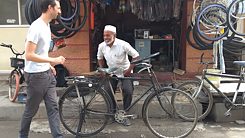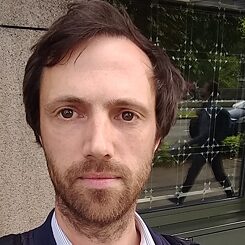While at 1 Shanthi Road, I produced several works; one was a bicycle featuring a steering wheel mounted on it (plus horn), one was a bicycle bell installed on an SUV, and a third was a performance for video in which I ‘rode’ through the city on an exercise bike mounted on the back of a small truck.
I applied and came on the
bangaloREsidency with one proposal, but ultimately pursued a quite different idea. I responded to the situation in which I found myself in the city. I had originally deliberately proposed a project that did not comment too directly on Indian society. As a British/Western artist relatively new to the Indian context, I didn't want to naively claim to understand it. The original proposal, to make a plastic bag collection, could be initiated in any place, and both respond to that particular site and issues affecting the wider world.
I think artists working on a residency always find themselves in a dichotomy. On the one hand, they are in a new context and need to respond to that; on the other they need to be careful not to make overly ambitious claims about understanding that context after a short time there, as ‘parachuted in’ artists (and this especially if they are, as in my case, a Western artist in a global south context - or from the former colonial power!). I see this as a scale upon which artists on residencies work, and there is no simple answer; it needs to be negotiated. In my time in Bangalore I shifted slightly from the former to the latter end of the scale, by responding critically to the situation.
I'm pleased with this shift, because I did not simply respond to the context, but I brought with me concerns and sensibilities that I'd developed in Berlin - around mobility and traffic. In Berlin, I spent the half a year prior to going to Bangalore thinking about mobility, whilst working with the Deutsche Bahn. On arrival in Bangalore one is confronted with the traffic, in a both practical and corporeal way. Practically I initially found it difficult to move in the city, using primarily app-based taxi services, and later a little more walking, local buses and occasionally the metro. This is a huge contrast to Berlin, where I primarily use my body to move - cycling, or walking. Soon I really began to notice the lack of physical activity. I simply couldn't walk - there are often no pedestrian crossings or pavements, and walking becomes a chore, being constantly honked at and dodging cars when crossing the street. There are few cyclists in the city, and most Bangaloreans I met were shocked at the idea of cycling, or told me they used to do it as a child. Cycling also appeared to be largely a means of transport for poorer people, in contrast to in Germany, where all classes of people cycle, but perhaps even more middle class people.
 © Oliver Walker
© Oliver Walker
In addition to the influences I mentioned above, the work I realised responds, in part, to the way the roads themselves feature such a mix of transport. Lanes are not recognised, and motorbikes, buses, cars and taxis; push carts, bicycles and people weave in and out between each other. Perhaps my transport mash ups are a response to the way the different forms of transport on the streets mix.
Another factor which shaped the way I worked was the availability of workshops in the immediate vicinity of the residency, their openness to trying to solve problems, and how ready the residency hosts were to help me discuss my ideas with the workshops.
Within a few minutes’ walk or ride from the residency we found a used car-part neighbourhood, a cycle workshop, a motorbike workshop, hardware shops, and a tailor. It wasn't just the proximity which made a difference; the workshops are physically open (they have an open shutter, rather than a door, and the activity is often fully visible). This is in contrast to light industry in western cities, which is often more geographically separated from residential areas, the activity is visibly separated, and the employees and business owners would tend to not have the time and the interest to discuss things in such an open-ended way. Here, on more than one occasion, someone invited me to jump on their motorbike, and took me a few streets away to find a part or get something fixed. It was easy to get into conversation and simply start. In addition, I shouldn’t forget the economic factor - here I could afford certain things with an ease that I perhaps couldn’t in Germany. This is an economic situation that has arisen through historical factors that I shouldn’t overlook.
I enjoyed often getting back to 1 Shanthi Road in the evening to find a heated but friendly debate at the table. This is the same table where breakfast and lunch are eaten, laptops are tapped away on and sketchbooks filled, and drinks for the openings are served. Shanthi Road makes sense in India - with a partial dissolution between private and public space. The studios, for retreating to, are piled above the courtyard like a house of cards, while the courtyard, kitchen and living room below are where more communal life takes place. This extends to people who used to live there, or who live in Bangalore, who’ll arrive and make themselves at home at various times of the day. People pop in, and that makes it a great place to be.
 © Oliver Walker
© Oliver Walker
Several of the Goethe residents came together and decided it would make sense to do a group show at 1 Shanthi Road. Right from the start, we knew we wanted to try and utilise the various spaces that Shanthi Road has, and we managed this: with my piece illuminated on the street, the gallery hosting an installation and photographic series and the courtyard a projection, the living room featuring portraits smuggled into the existing collection, and the rooftop a beautiful video piece with the city as a backdrop. Visitors were encouraged to explore all the different spaces.
These factors, and being around an environment of making at 1 Shanthi Road, meant the whole process of having an idea and realising it was accelerated, and I found I felt more relaxed about producing. My whole time there was productive.


